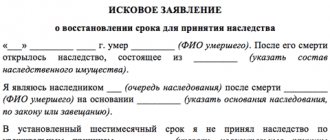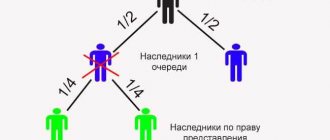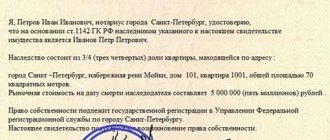Types of inheritance
The Civil Code of the Russian Federation provides for two types of inheritance: by law and by will. In the first case, the property is inherited by the closest relatives of the deceased in the absence of a will; in the second, the heir can be any individual or legal entity, as well as the state. Each type of inheritance has its own characteristics; let’s consider the most significant of them.
Inheritance by law
Inheritance by law provides for the transfer of the testator's property to all inherited relatives, who by law are divided into several lines. Today, on the territory of the Russian Federation, there are eight main lines of heirs by law, these are:
- parents, spouses and children (as well as grandchildren/their descendants by right of representation - heirs of the first priority);
- sisters and brothers, grandparents, nieces and nephews - heirs of the second stage;
- aunts and uncles, cousins and brothers - heirs of the third stage;
- great-grandparents - heirs of the fourth stage;
- children, nieces and nephews, sisters and brothers of grandparents - heirs of the fifth stage;
- cousins and uncles, grandchildren and children of nephews and sisters/brothers - heirs of the sixth stage;
- stepdaughters and stepsons, stepmother and stepfather - heirs of the seventh line;
- The eighth priority consists of heirs who are disabled persons, who were dependent on the testator for at least one year before the death of the testator and who live together with him, and who are not included in the first seven priority groups.
All property inherited by law is divided equally between the heirs of the corresponding line, and one can become an heir of each line on the conditions that the heirs of the previous line did not accept the inheritance, refused it, lost the right to it, or are absent.
In addition, in Russia they inherit by rights of representation if the heir by law dies before the testator, or at the same time as him, then his descendants have the opportunity to inherit the property of the deceased relative.
Inheritance by will
According to the norms of Russian legislation, the right to bequeath property for a citizen is an element of legal capacity. The testator has the full right to dispose of any of his property in the event of his death by drawing up the necessary document, including disinheriting one or more heirs by law.
A will can only be drawn up in writing, it must be certified by a notary, or in special cases, appropriate certification of the document by an official is allowed, for example, if the testator is in a medical institution, then the chief doctor, in a military unit - the commander of the unit, etc. Failure to comply with this requirement results in the will being declared invalid. The only exception can be the basis presented in Art. 1129 of the Civil Code of the Russian Federation, when there are extraordinary circumstances that pose a clear threat to a person’s life, in this case it is allowed to draw up a will in simple written form, in the presence of two witnesses.
Heirs under a will can be individuals, private companies, the state and even international organizations. The testator has the right to cancel, amend or supplement his will at any time without the obligation to indicate a reason for this action.
The probate process
To register their will, Russians turn to any chosen notary. Thanks to the averaging of tariffs for their services, prices are approximately the same for all specialists. The testator must understand that he has the right to independently choose the rules for conducting certification. This can be a secret procedure or during the notary’s direct review of the text.
In addition, there is the right to include witnesses and third parties. The latter are explained by the physical limitations of the testator and the inability to write the text in his own hand. Then the representative does it for him. In some cases, a notary may request medical confirmation of the sanity of the future testator if he has any doubts about this.
What applies to secret orders?
A closed or secret will is formed on the basis of Art. 1126 Civil Code. It presupposes complete preservation of the secret of the content. Even from a notary. At the same time, the latter still explains to the testator the rules for filling out the form, the paragraphs to be included, and reminds the testator of the right to a mandatory share of dependents.
In addition to the concept of a closed will, inheritance law uses terminology about the secrecy of a will. It applies to all options for drawing up an order and involves the protection of information by the notary and the office staff.
What cannot be recorded
The testator has the right to indicate any persons in the text of his order and divide his property between them as he pleases. Moreover, he may include a testamentary assignment here. That is, a requirement for donees, the fulfillment of which will result in the implementation of their rights. It is unacceptable to specify conditions that go beyond the scope of legality.
Who can be the heir
Legal heirs can be individuals who are alive on the day the inheritance is opened, or who were conceived during the life of the testator and born after the opening of the inheritance. Also, the state may be called upon to inherit an inheritance if the inheritance is recognized as escheatable property.
In addition to individuals, legal entities, municipalities, states, including foreign and international organizations can also be involved in inheritance under a will.
Deadlines in inheritance
The inheritance opens with the death of the testator; the day of opening is the day of the citizen’s death. When the testator is declared deceased by the court, the day of opening of the inheritance is the day the court decision enters into legal force.
A citizen must enter into inheritance rights within 6 months from the date of opening of the inheritance; at the end of this period, the heir loses the right to receive the inheritance, except in cases where he can voice a valid reason for non-compliance with the legal deadlines for entering into the inheritance, then the court can restore the deadline inheritance of property.
It is also worth noting that the place of opening of the inheritance is the immediate last place of residence of the deceased; if it is unknown or is located outside the territory of the Russian Federation, then the place of opening of the inheritance is considered to be the location of the inherited property.
When does a person become a testator?
After the death of a person, the fate of the property belonging to him during his lifetime is determined by the state. All property of a deceased person is divided among his legal successors. If there are no legal heirs, then everything acquired through back-breaking labor goes to the state. But it happens that a person wants his property to go to certain people after death. In this case, he must write a will.
The testator is the person who wrote the testamentary disposition and duly executed it with a notary.
Inheritance procedure in Russia
Russian legislation provides for two ways to accept inherited property:
- the heir submits an application for acceptance of the inheritance to a notary;
- carrying out certain actions that may indicate the actual acceptance of the inheritance: payment of expenses for maintaining the property from one’s own funds; taking measures to preserve property; taking possession of property and other actions provided for in paragraph 2 of Art. 1153 of the Civil Code of the Russian Federation.
Thus, the law makes it possible to become the actual heir of the property of the deceased, excluding the established procedure for inheritance, which entails the heir applying to a notary’s office. However, it should be borne in mind that the fact of acceptance of the inheritance will need to be established in court.
If the inheritance by law or will passes to two or more heirs, the property comes into common shared ownership from the date of opening of the inheritance, after which it can be divided by mutual agreement of the parties or the shares of the heirs can be determined by court claims.
Opening an inheritance case
When opening cases, the notary checks the presence of a will in the unified information database of the notary. Next, he notifies the heirs known to him about the event that happened and the existence of their right to claim. The date of application for different clients in an open case may be different, but the period of acceptance for all begins when a property or other inheritance is opened.
It is necessary to distinguish between two basic concepts of inheritance law: opening of inheritance and inheritance. The second is carried out by the notary upon the provision of the necessary documents by the client.
If the case is already open at the time of the visit of one of the applicants, then he needs to present not the original, but a reduced package of documents. For example, a death certificate is already excluded from this list, as well as property documentation. The notary personally approves each candidate and only then issues a form to complete the application.
What else you need to know about inheritance in the Russian Federation
1. Unworthy heirs. In the field of inheritance, legislation establishes such a concept as “unworthy heirs”:
- persons who, by deliberate actions against the testator or his heirs, contributed to the recognition of themselves or other persons as heirs of the property of the deceased;
- parents who were deprived of parental rights and restored to these rights by the day the inheritance was opened;
- persons who maliciously evade fulfillment of obligations to support the testator assigned to them by law.
2. Mandatory share in the inheritance. When drawing up a will, the law obliges the testator to allocate a mandatory share to his minor or disabled children, disabled spouse or parents, as well as disabled dependents (Article 1149 of the Civil Code of the Russian Federation). Even if these norms of the law are not observed, this category of heirs, regardless of the will, inherits at least ½ share of the property that would be due to them if inherited by law. A will that infringes on the rights and interests of legal heirs can be challenged in court.
3. The heirs are liable for the debts of the testator. In accordance with Art. 1175 of the Civil Code of the Russian Federation, each heir is liable for the debts of the testator within the limits of the value of the share transferred to him in the property by inheritance.
4. Escheatable property. If there is inherited property that for any reason cannot be inherited by law or by will (lack of heirs, refusal of inheritance, etc.), this property is recognized as escheat and transferred into ownership of the state, while real estate can be transferred owned by a city or municipality.
Basic principles of inheritance law
The main direction of the civil regulatory framework is to implement the rights of all members of society and monitor compliance with their duties. Moreover, this standard works in the presence of bilateral agreements, the execution of a unilateral transaction, or the absence of a relationship as such. The peculiarity of specifically inheritance legal relations is based on their subject and methods of legal regulation.
In fact, the transfer of inheritance is the same transaction of alienation of one’s property from one person to another (or group of persons). In this case, receipt of an inheritance is based on the emergence of such a right in a person and its confirmation by documents or in practice. Since everyone also has the right to file a claim, the acquisition of rights to inheritance is allowed, bypassing the opinion of the testator, as well as other heirs.






